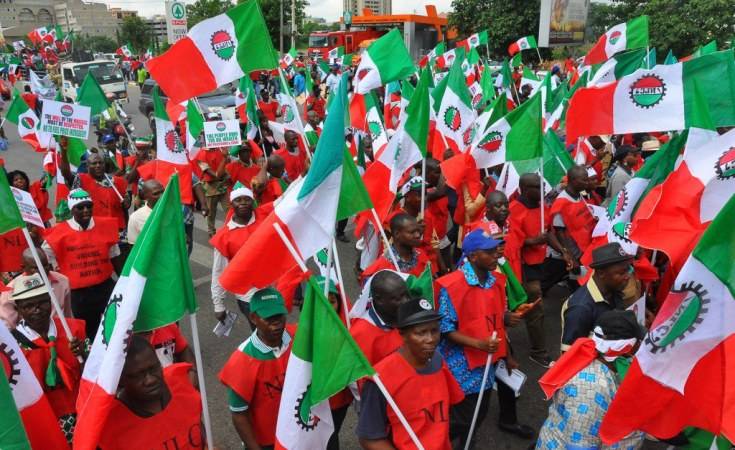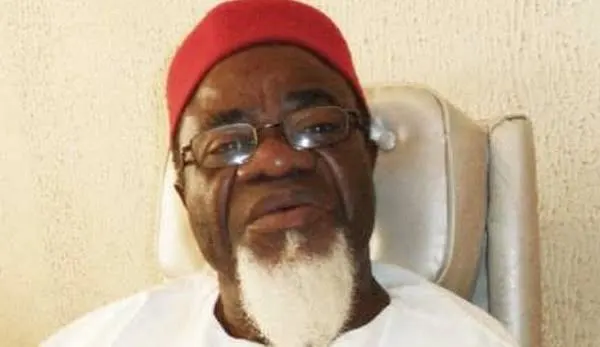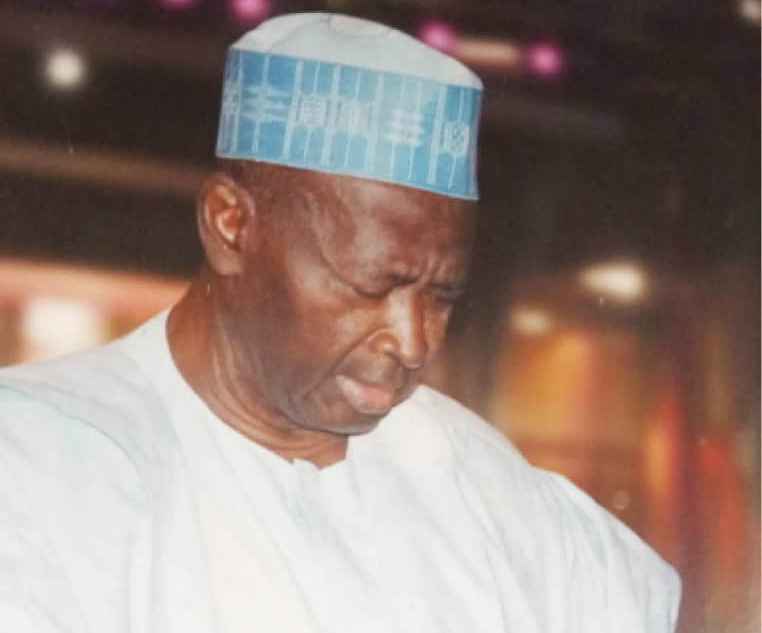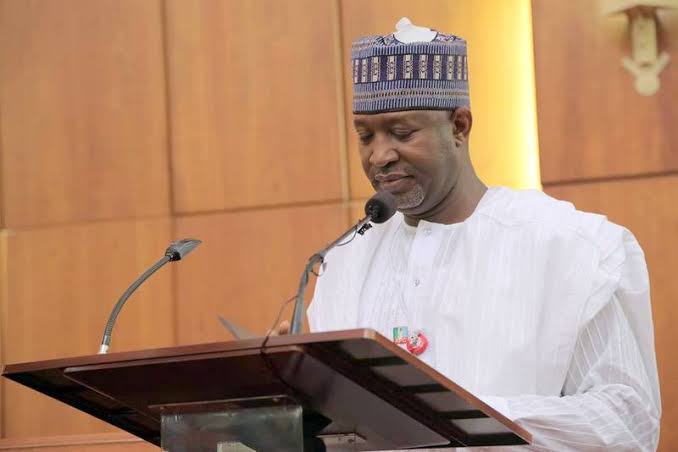Planned strike: Oil, electricity workers’ unions direct members to comply with labour’s directive as organised private sector accepts FG’s N60,000
Following the announcement of the organised labour to begin an indefinite strike on Monday, June 3rd, 2024, over the federal government’s failure to meet their demand for the proposed new minimum wage, the Nigeria Union of Petroleum and Natural Gas Workers (NUPENG) has directed its members to comply with the directive of the two labour centres to begin an indefinite nationwide strike.
Mr Afolabi Olawale, the General Secretary of NUPENG, in a statement on Saturday, said the union was committed to ensuring total compliance with the directive.
The Informant247 reports that following the federal government’s refusal to raise the minimum wage from N60,000 to N494,000, the organised labour, on Friday, declared its intention to embark on an indefinite strike.
It was gathered that Joe Ajaero, the President of NLC, while disclosing this at an ongoing press conference in Labour House, Abuja, said the strike begins by midnight of Sunday, June 2, 2024.
Ajaero, who was flanked by the President of TUC, Festus Osifo and other Labour leaders at the briefing, called on Nigerians to rise and defend their interest over the failure of the government to prioritize the welfare of workers.
However, Afolabi said the union was concerned and disturbed by the insensitive attitude of the federal government “to the very critical issue of negotiating a new minimum wage for Nigerian workers”.
“This is in view of the various socio-economic policies of this administration that have impoverished the working people of this country.
“Leaders of our great union at all levels, from the units, zones and branches should immediately put all processes in place to ensure total compliance with this directive.”
Also, the National Union of Electricity Employees (NUEE) said it was mobilising its members to embark on the strike following the directive of NLC and TUC.
The Acting General Secretary, Mr Dominic Igwebike, gave the directive to the members in a statement.
Igwebike said that along with the reasons for inconclusive negotiations on the minimum wage and electricity tariff hike, apartheid categorisation of Nigeria’s electricity consumers into bands was another to embark on the strike.
“Given the above, all national, state, and chapter executives are requested to start the mobilisation of our members in total compliance with this directive to ensure the government does the right thing as stated above.
“The withdrawal of services becomes effective on Sunday 2nd June by 12.00 midnight,“ the union leader said.
Organised private sector accepts FG’s proposed N60,000 minimum wage
Meanwhile, the Director-General of the Manufacturing Association of Nigeria, Ajayi Kadri, has confirmed that the organised private sector accepted the Federal Government’s proposal for a new minimum wage of N60,000.
Ajayi, who disclosed this during an interview with Channels TV in Abuja on Saturday, clarified that ongoing negotiations between the government, the private sector and labour were focused on establishing a minimum wage rather than a living wage, which represents the lowest amount that can be paid to any worker in the country.
He also stressed that both labour and private businesses have been facing significant economic challenges, making it extremely difficult for them to meet the wage demands put forward by labour unions.
He stated, “To start with, this is a very difficult time for anyone to negotiate minimum wage. From the perspective of government, labour and organized private sector, we operate in an environment where there is general acceptance of the fact that the macroeconomics are not right; even the global economy is experiencing a lot of shakeups and the aftermath of government necessary reforms.
“From the beginning of the negotiations of the minimum wage, it’s evident to the tripartite— that is, the government, labour, and organized private sector— that we are going to operate in a difficult terrain.
“Incidentally, the organized private sector and government have offered N60,000 as the minimum wage and I think it is very important for us to understand that what we are talking about is the minimum wage. That is what some people have called the walk-in wage. That is the amount we will pay the least workers in the country. It is the minimum wage we are negotiating, not a living wage,” Ajayi said.
Ajayi disclosed further that both the government and the private sector face significant constraints in fulfilling the proposed N419,000 living wage request.
He mentioned that the private sector, for example, is dealing with economic challenges and inflation, making it impossible to pay such an amount.
He also explained that this is not the most appropriate time for organized labour to negotiate a new minimum wage. Instead, they should collaborate with other stakeholders to strengthen the economy.
“All of us in the tripartite— the government, the labour, and the private sector — we all knew that we were operating in a very difficult environment. The government itself realized that it had limited capacity to pay. The private sector is constrained by microeconomic, infrastructure and security challenges. So, we are also constrained to pay.
“Labour, on its part, is under intense pressure from its constituencies to ask for a higher wage because inflation has hit the roof and the operating environment is tough.
“Throughout the negotiation process, we made it known that this is not the best time to negotiate minimum wage. This is the time for us to agree, the crew behind the government, and grow the economy in such that we will bake a bigger cake, and then we’ll be able to share,” the director general added.
He, however, appealed to the organised labour to reconsider its decision to embark on a nationwide strike.
He noted that the labour walking out of discussions and declaring strike would not help matters.
He added that it is unfortunate that labour rejected the N60,000 offer from the government and the organised private sector, choosing to declare a nationwide strike.
“We cannot afford to cripple the economy when all we needed to do was continue to build it. I think President Tinubu was very clear when he emerged as president that these are not going to be easy times, and I think we needed to tighten our belts to deliver on economy that we know has been seriously battered,” Ajayi-Kadir said on Channels Television’s Sunrise programme on Saturday.
“Of course, the government on its own side has to demonstrate leadership, sensitivity and sense and sense of mind as well as the sense of occasion of the period that we are in. So, government expenditure, government choices of what needs to be done, how much to be spent, the cost of governance itself, all of it has to come to the table.
“I think what labour is actually worried about is that they appear to be the ones on the brunt of it, but we needed to be able to engage, walking out on the process and declaring a strike; I do not think that that is what is going to solve this issue,” he added.
On Friday, organised labour declared a nationwide indefinite strike over the Federal Government’s refusal to raise the proposed minimum wage from N60,000.
They claimed that the strike followed the expiration of an earlier request to the Federal Government to conclude all negotiations for a new minimum wage before the end of May.







